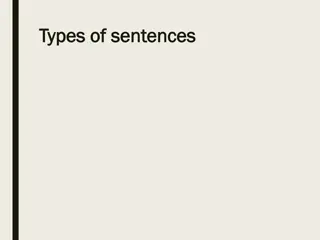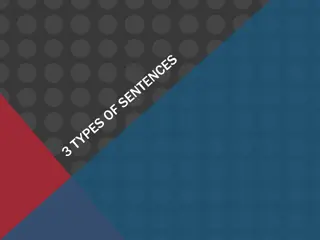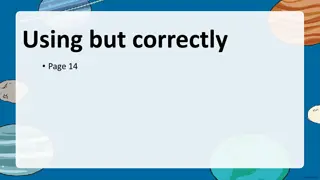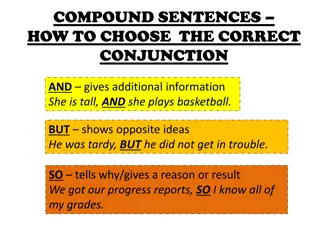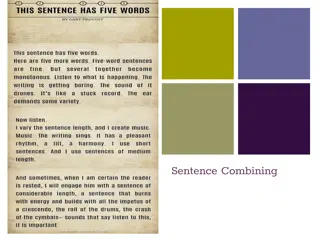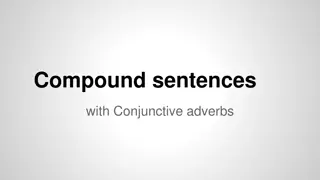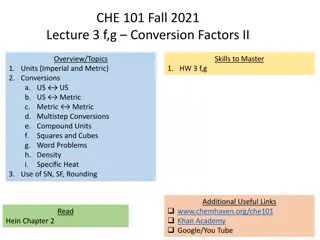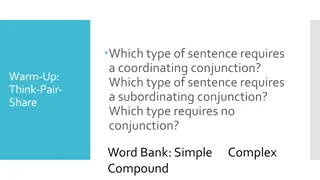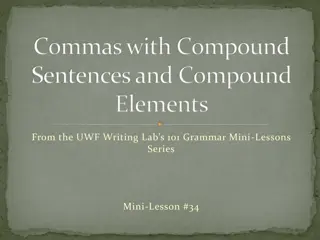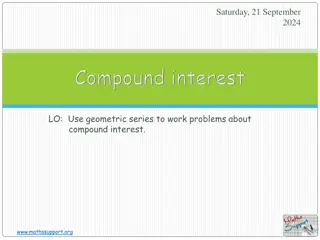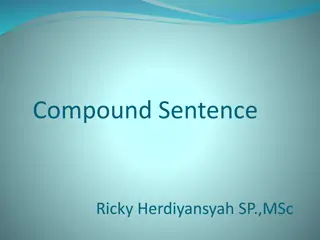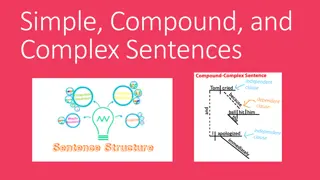Understanding Complex and Compound Sentences: Conversion and Examples
Learn about the differences between complex and compound sentences, identify principal and sub-ordinate clauses, and understand how to convert complex sentences to compound sentences. Explore examples and practical tips for effective sentence structuring.
Download Presentation

Please find below an Image/Link to download the presentation.
The content on the website is provided AS IS for your information and personal use only. It may not be sold, licensed, or shared on other websites without obtaining consent from the author. Download presentation by click this link. If you encounter any issues during the download, it is possible that the publisher has removed the file from their server.
E N D
Presentation Transcript
WELCOME WELCOME
PREPARED &PRESENTED BY: MD. MANSURUL HOQUE PIEAL MD. MANSURUL HOQUE PIEAL Assistant Teacher Assistant Teacher BAMNI ADARSHA HIGH SCHOOL BAMNI ADARSHA HIGH SCHOOL RAIPUR, LAKSHMIPUR
Changing Sentence Complex to Compound Part-1
Learning Outcomes By the end of the lesson, students will have 1. been able to understand Complex & Compound Sentence. 2. been able to identify Complex & Compound Sentence. 3. learnt to make Complex & Compound Sentence. 4. learnt to identify Principal Clause & Sub-ordinate Clause. 5. learnt to change from complex to compound.
Discussion Compound Sentence A compound sentence has two or more independent clauses which are joined by co-ordinating conjunctions. Co-ordinating Conjunction and but or Principal Clause I ate rice He is poor Read attentively Principal Clause (I) went to school. (he is) honest. you will fail in the exam.
Complex Sentence A complex sentence is a sentence having a principal clause and one or more sub-ordinate/dependent clause. Principal Clause Subordinating conjunction I know where She can not go out because Wait here till We eat so that Listen to what You can not prosper unless We know when Sub-ordinate Clause he lives. she is ill. I return. we may live. I say. you work hard. he will come here.
The basic ideas of complex to compound *** In case of complex to compound, the subordinating conjunction has to be removed and the coordinating conjunction is placed between the clauses. The dependent clause has to be changed to the independent clause. *** If the subject and verb of the two clauses are the same in the compound sentence, even if the subject and verb are not placed in the 2nd clause.
The basic ideas of complex to compound ***The way to remember the co-ordinating conjunctions is FANBOYS. F=For, A=And, N=Nor, B=But, O=Or, Y=Yet, S=So. *** In the compound sentence, the previous event sits before and the next event after.
1. Complex: Though/Although Compound: But/Yet Complex: Though the man work hard, he could not succeed. Dependent Clause Subordinating Conjunction Independent Clause Compound: The man work hard yet he could not succeed.
Subordinating conjunction Complex: He is honest although he is poor. Independent Clause Dependent Clause Compound: He is poor but honest.
2. Complex: so . that Compound: very .. and Complex: The old sailor spoke so strangely that the guest stood still. theguest stood still. Compound: The old sailorspoke very strangely and
Complex: She is so weak that she cannot stand. and she cannot stand. Compound: She is very weak
3. Complex: If + Affirmative Clause Conpound: and (The 1st clause will be imperative) Affirmative Complex: If you speak the truth, you will be pardoned. Dependent Clause Subordinating conjunction Independent Clause Compound: Speak the truth and you will be pardoned.
Subordinating conjunction Affirmative Complex: You will pass if you read attentively. Dependent Clause Independent Clause Compound: Read attentively and you will pass.
4. Complex: If + Negative Clause/ Unless Compound: or (The 1st clause will be imperative) Negative Complex: If you do not walk fast, you will miss the train. Independent Clause Dependent Clause Subordinating conjunction Compound: Walk fast or you will miss the train.
Negative Complex: Unless you study, you will fail. Dependent Clause Subordinating conjunction Independent Clause Compound: Study or fail / you will fail.
Individual Work Change the following sentences as directed. 1. Though he is poor, he is honest. (Compound) 2. If you work hard, you will shine in life. (Compound) 3. Although he has riches, he leads a poor life. (Compound) 4. If you do not do, you will die. (Compound) 5. He is so weak that he cannot walk. (Compound)
Home Work Change the following complex sentences to compound. 1. If you follow me, you would feel better. 2. Although it is difficult to explain, it exists. 3. If you do not try heart and soul, you cannot pass. 4. The man got so tired that he could not work any longer.
Assalamu Alaikum Warahmatullah




